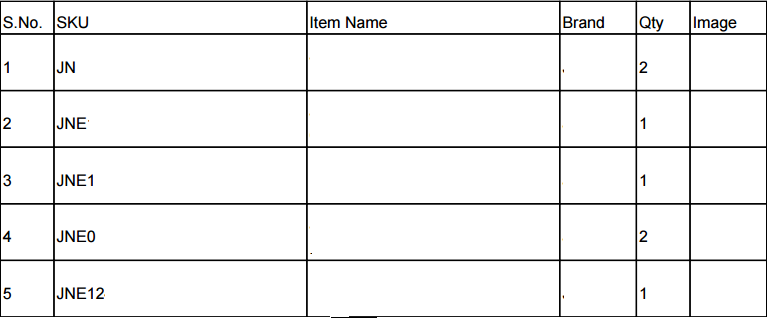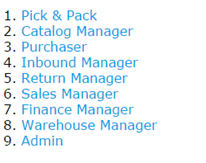Warehouse Management plays a major factor in the performance abilities of supply chain operations. Therefore, you need to install a software that manages your daily operations; enhances productivity; and ensures customer satisfaction leading up to significant profits.
A good Warehouse management software helps you in receiving the inventory, placing them on the designated shelf; improve the picking and shipping of orders and get real-time information on the inventory. Warehouse management softwares can be a standalone application or it can be integrated into your existing ERP system as well.
Utilising a strong Warehouse management software can immensely benefit your eCommerce and retail business. Some highly useful advantages include:
- Lowering Labour Costs
- Enhancing Inventory Accuracy
- Improve flexibility in operation
- Reducing errors while picking and shipping of goods
- Upgrading customer services
- Accessing real-time data
Wit these, WMS enables you to manage complete warehouse related activities including but not limited to orders, shipments, receipts and intra-warehouse movement of goods.
What are the best practices & processes for warehouse management?
So, if you are planning to opt for any management software for your new warehouse or planning to upgrade your existing system, ask these questions:
Below are 10 Key Questions one must ask before opting for any warehouse management software, to get Maximum benefits of their solutions.
1.Can it handle orders from multiple marketplaces?
You must be selling on 6-8 marketplaces all at the same time and so, it is important for any WMS solution to provide the sellers with the ability to seamlessly process orders of all marketplaces so that the inventory can be managed accordingly.
2. Does the solution provide you inventory accuracy?
Inventory management is a big problem for sellers, particularly when you have to manage 100+ dispatches every day. Managing the inventory manually, tracking it timely and updating the stock after each day’s sales is a hectic task which when not done with complete accuracy leads to unmanaged and errorful operations.
Any errors in inventory not only results in loss of working capital but also impacts sales volume as inventory listed on marketplaces is the key factor in determining sales for all online sellers. Thus, an automated system above a manual one to manage inventory accurately can go a long way in managing complex warehouse operations.
3. Will you be able to manage all the sections of your warehouse?
Most sellers end up doing an ad hoc management of their warehouse, causing inventory errors, stock-outs, etc. which lead up to a lot of mismanagement. It is imperative that the WMS you choose allows you to define zones, bins, locations, etc. so that your warehouse can be neatly organized.
Your WMS solution should allow you to define zones based on product categories, product velocity (i.e. how fast or slow a particular product is selling) or any other such criteria which are important to your business.
Most leading WMS solutions still do not have a very comprehensive implementation of this requirement, but some new-age solutions like Unicommerce provide the flexibility to manage the warehouse in a very systematic manner with cycle count enabled and RFID barcode scanning to handle returns as well as maintain the serial numbers.
4. Is it compatible with various third-party hardware devices?
With increasing volumes by the minute, it becomes impossible to operate a warehouse manually. Seeing the need, sellers have begun to invest in deploying Bluetooth-based handheld devices to automate key warehouse processes.
These handheld devices are not very expensive and can be procured anywhere in the range of Rs. 5-10k, adding a lot of value in terms of improving productivity, reducing errors and are able to recover the cost of investment in less than 6 months if used with a proper system.
5. Does it help to optimize the picking process?
Using manual or traditional systems typically leads to a lot of inefficiencies in the picking process. Eventually, the picking staff ends up wasting time trying to locate the right product.
If they end up picking the wrong product, it only adds to the delay as they are then required to put the product back and fetch the right one for dispatch. All of this leads up to monetary losses.
And so, it is important that the WMS solution one uses has inbuilt features like picklists, FIFO based picking etc. to ensure that picking of goods happen in an efficient manner.
.

6. How easily can you manage returns in the WMS?
For any online seller, returns are a big pain area, as it adds directly to the cost, and every seller continues to grapple with this issue. If returns are managed properly, the profitability of any seller can easily improve by 10-15%, thus it is important that the solution deployed by you is able to handle such a critical process seamlessly.
It is important that your WMS solution should be able to scan each item and identify the order against which the return is received. The solution should also be able to reconcile the returns for which the item itself is not received.
All these features are already supported in Unicommerce, making it a preferred tool for handling returns seamlessly without any hassles.
7. Does it have an access control feature?
With data theft and stock pilferage a day to day reality for most sellers, it is important that the solution you choose provides the ability to configure secure access to the system.
The solution should provide a definition of roles to the users and grant access to the users based on the roles assigned to them. The roles should also be flexible enough to map all the warehouse processes. For example, Unicommerce provides the flexibility to define up to 9 roles in its solution.

8. Does it provide quality checks?
Due to the regular wear and tear in the warehouse, some stock may not always be in a sellable condition. For example, a stock may be damaged while lying in the warehouse, and the operator may discover the “bad” stock only at the time of the dispatch.
To avoid situations like this, it becomes important that the WMS you choose allows you the flexibility of doing quality testing at every key checkpoint (inbound, outbound, picking etc.).
9. Does it help in tracking shipments across multiple delivery partners?
Ecommerce sellers have to deal with various shipping providers (marketplace provided shipping, self-shipping etc.) and it’s quite troublesome to deal with multiple shipping partners.
Thus, it is important that the WMS you choose helps you track shipments across various delivery partners. In addition, the system should allow you the adaptability of defining the priority of shipping providers or build custom rules. For example, fragile items should go through courier X only, or high-value items should go through courier Y only. All this is currently supported in Unicommerce.
10. Does it provide comprehensive analytics to assess your operations?
Analytics is a powerful tool and the insights that you can draw from your WMS solution can be useful in making key business decisions related to growth, productivity, unit economics, etc. It is important that the WMS solution not only provides comprehensive data but also presents the data in an easily comprehensible manner.
Unicommerce currently supports 100+ marketplaces, carts, logistics providers, ERP & POS systems and is the first choice of over 10,000 brands, sellers and retailers to be their Warehouse Management Solutions provider.
Unicommerce allows multiple technologically advanced warehouse management solutions such as handheld, FIFO, batching, cycle count, etc., and continues to evolve its offering in this regard.
Effective warehouse management translates to having the right amount of the right product at the right location delivered just in time to satisfy customer needs at minimum cost and Unicommerce is capable of imparting that for your business.
So what are you waiting for? Register today with Unicommerce, the leading supply chain operations management to ease your daily eCommerce as well as a retail business!





